Support OpenDurham.org
Preserve Durham's History with a Donation to Open Durham Today!
OpenDurham.org is dedicated to preserving and sharing the rich history of our community. Run by our parent nonprofit, Preservation Durham, the site requires routine maintenance and upgrades. We do not ask for support often (and you can check the box to "hide this message" in the future), but today, we're asking you to chip in with a donation toward annual maintenance of the site. Your support allows us to maintain this valuable resource, expand our archives, and keep the history of Durham accessible to everyone.
Every contribution, big or small, makes a difference and makes you a member of Preservation Durham. Help us keep Durham's history alive for future generations.

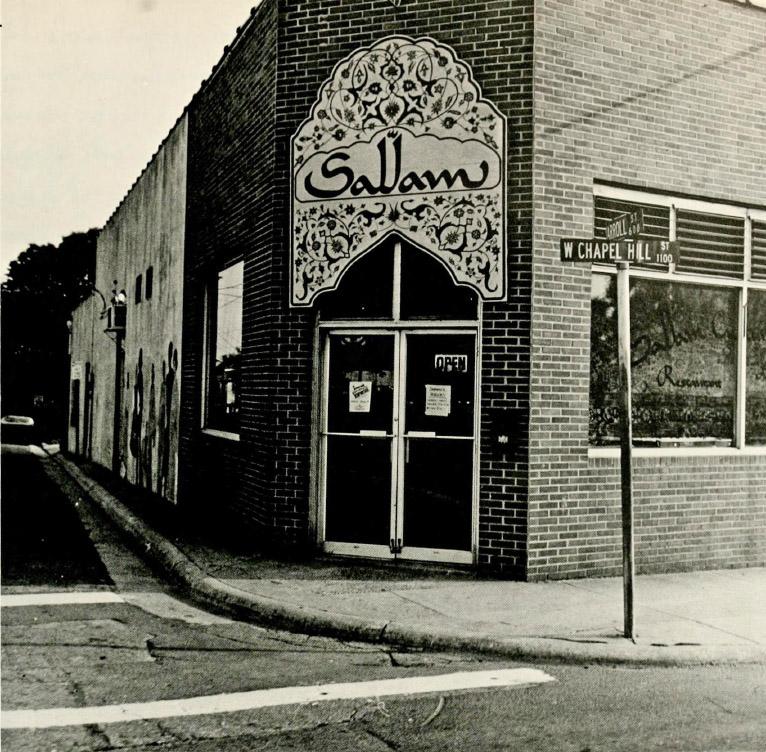
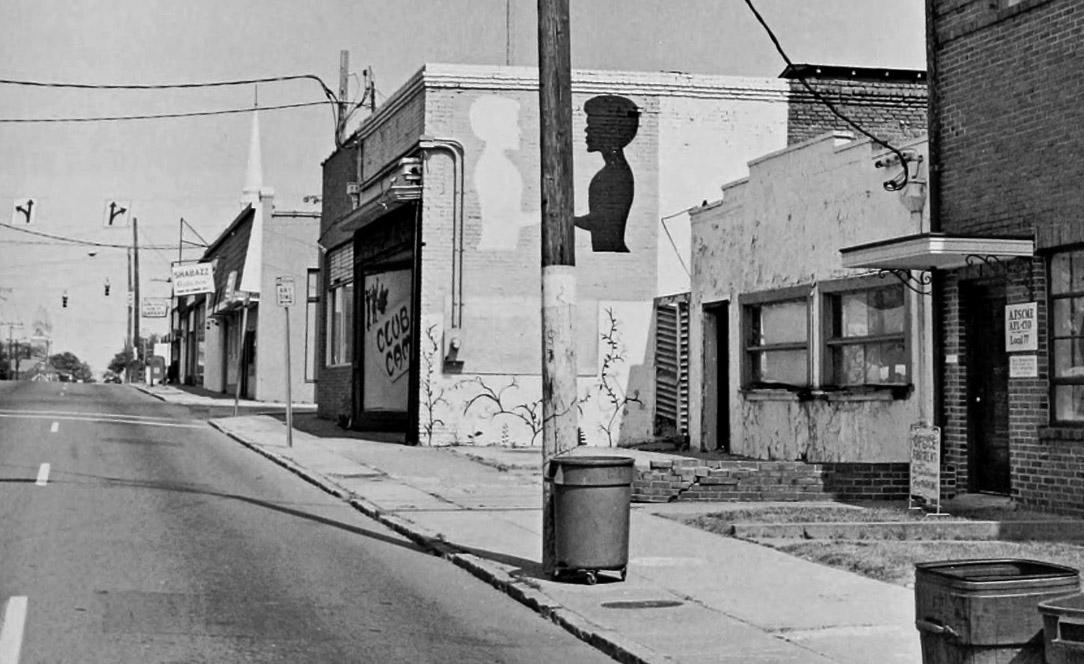
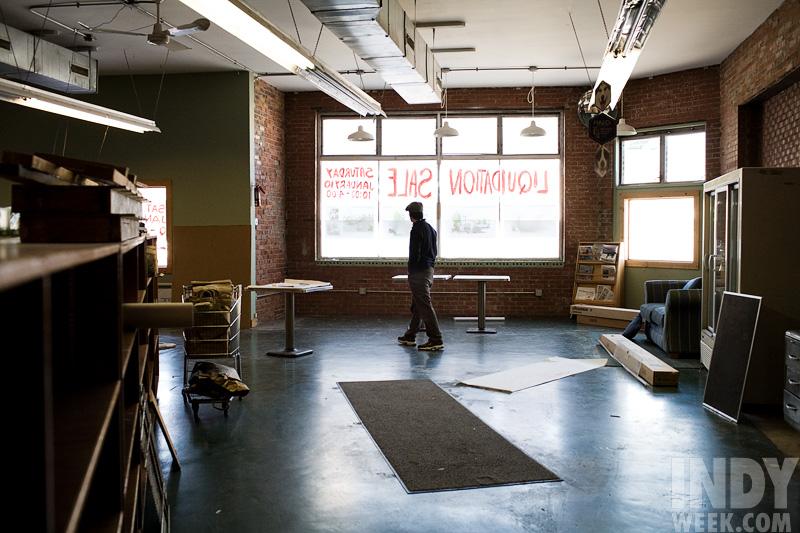
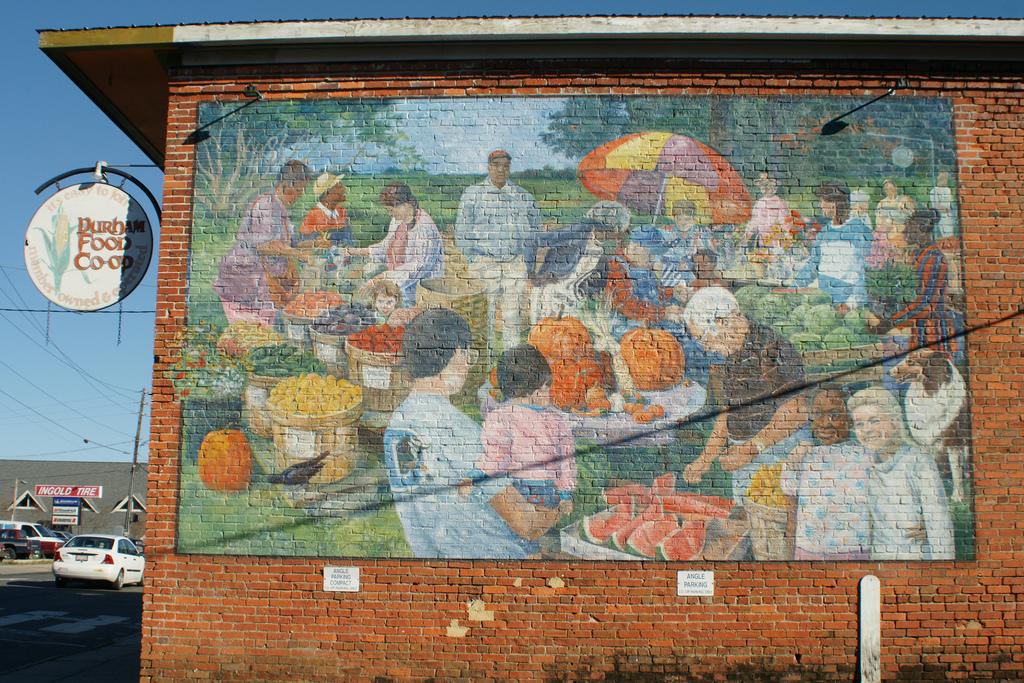
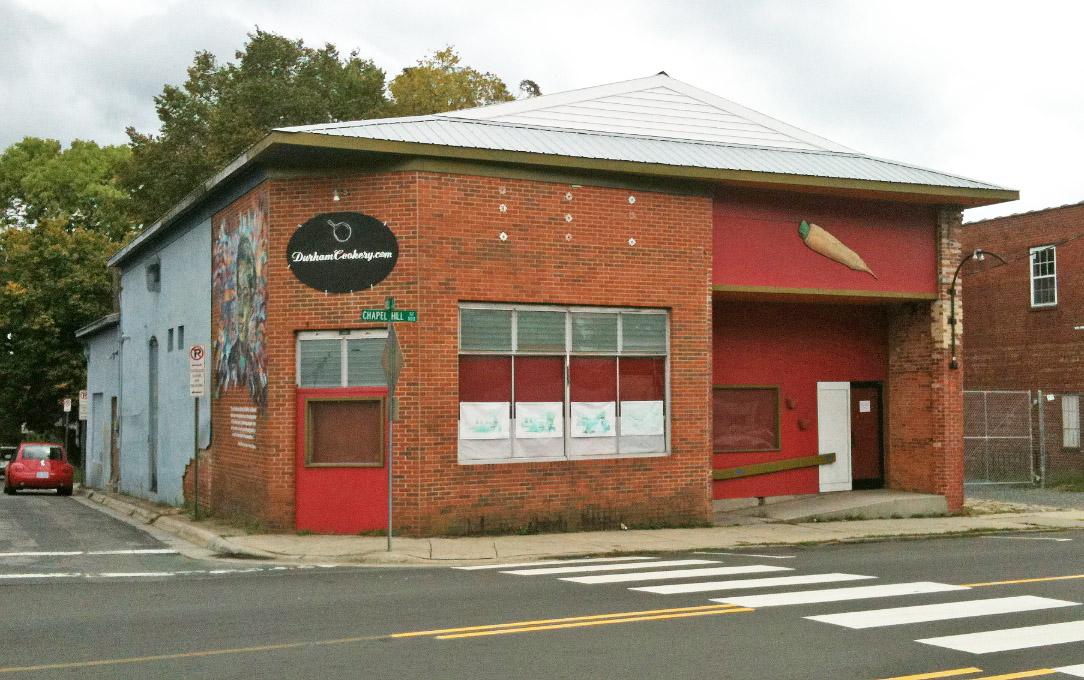

Comments
Submitted by dcrollins (not verified) on Thu, 12/14/2006 - 4:14am
The Durham Food Co-Op...could be a central place for the community, a la Weaver Street in Carrboro. But Carrboro, this ain't.
True dat. I love the Durham Food Co-Op as much as the next organic-food-eatin', hemp-wearin, think-globally-eat-locally boho, but what's wrong with them can be summed up in one word: meat. Say what you will about Whole Foods and their corporate hegemony, but at least I can get prosciutto de Parma and scottish smoked salmon.
Yes, I know they do special orders, but you have to order it like a week in advance...and endure the hate stares of the holier-than-thou vegans. And what am I going to do with the minimum order of fifty bucks worth of bacon? They weren't even selling turkeys for T-giving. Everything's a hassle with these people. Talk about demolition by neglect -- have you been in there lately? Last I heard they are seriously overdue on their taxes. Best of luck to them, I'd sooner shop at Costco.
Anyway, it could be a cool business district. Reminds me of the one on Liberty St. (another fantasy of mine is to gentrify these storefronts on the outskirts of downtown).
Readers of this website might be interested in today's Wall Street Journal, where the founder of Toll Bros. expounds on the baby boomer resurgence of the inner city and his company's unlikely move from golf course developments to the Brooklyn waterfront. My old unheated loft in Williamsburg is now a neighbor to one of these steel and glass "urban lifestyle" residences; the neighborhood still doesn't have a bank, but they've got plenty of million dollar condos!
Submitted by dcrollins (not verified) on Thu, 12/14/2006 - 11:50am
This is a bit off the subject, but I recommend this article for the readership here. The libertarian case for less zoning is rarely heard, but it's a good way to ensure that your town doesn't end up like Cary (with plenty of jobs and no diversity) or Detroit (the other way around).
As someone who grew up in South Louisiana I've always hated Houston. It's got all the traffic, crime, and oppressive humidity of New Orleans, but without the fun. However, once I spent some time there I came to admire their model of "restrictive covenants". People do actually walk to shop. The covenants typically expire after 99 years, so a neighborhood can easily transition over the decades (from forests -> farmland -> exurbs -> suburbs -> bedroom communities -> high density arts havens -> organic farms) as economic growth and affluence permit. The historic town of Spring, TX is a good example. If you work in the Woodlands (built by the same developers as RTP) and live in Spring you have the best of both worlds. You can walk to shop, bike to work, and never need to visit Houston proper.
I'm not comfortable with the way Bogart so easily dismisses dedicated bus lanes and promotes car vouchers. But at least he's making the right argument: mass transit will never succeed until Joe Software Developer can actually save time relative to being stuck in traffic. Why would I drive 2.5 hours from Rumson, NJ to midtown Manhattan, when I can take the Fast Ferry direct to E. 34th St. in 30 minutes?
Proponents of mass transit always want to tax and spend their way to paradise, when what is really needed is to end the auto subsidy. When rail and/or buses is faster and cheaper relative to gridlock and ten bucks worth of tolls, it will succeed on its own terms -- and without the backroom land deals of Bill Bell and co.
Submitted by Sven (not verified) on Thu, 12/14/2006 - 1:37pm
Yeah, the Co-op doesn't work, although I wish they did. Idealism doesn't mitigate meager selection and high prices, though. I think they provide some life in what otherwise would probably be another storefront church, though ( I believe it would be the 6th in 1 + blocks.) I hope they can find their way to a better model, or at least swallow their pride and let Weaver St. take them over.
What business district on Liberty? I think you probably mean a different street, but I'm not sure which.
I wish I had time to give a fuller response to the question of zoning and Houston, because there is a lot to say. Although I disagree with much that Reason and JL have to say (particularly when they lose their 'reasoned' moorings and go apoplectic about rail,) I agree with some of their ideas about road/congestion pricing and using market tools.
However, the article linked here has a fair bit of gloss/distortions. As one who also grew up in South Louisiana, in New Orleans, I grew up with the same feelings about Houston. They haven't changed. Anecdotally, I found few places in Houston that aren't openly hostile to pedestrians, and most were around Rice/Med Center areas that were developed before most places in the country had zoning.
On a less anecdotal level, Houston has few statistics to recommend their model: low physical activity, high Vehichle Miles Traveled, air quality non-attainment for ozone, very low population (with accompanying high level of acres consumed), etc.
I agree that traditional zoning is a broken tool, but I think it needs to be revamped, not tossed. Houston probably has an equally complex regualtory environment, using specific ordinances an covenants rather than zoning. Zoning by use ( which came out of public health, but was quickly seized upon by private property owners as a way to create wealth by excluding undesirable elements from their neighborhoods - including industry and the undesirable people-du-jour) doesn't work well, and has helped facilitate sprawl. Mixing of uses (such as the pre-zoning West End) makes far more sense from many perspectives.
However, single use has had a lot more to do with the market than regulation - lots of people like exclusive residential pods and rail against traffic, 'outsiders' and whatever else might be generated by mixing of uses. New Urbanist models such as Southern Village have, for their copious flaws, made people realize that it doesn't have to be bad.
Argh. I wish I had more time, but my argument is:
1) Zoning by use doesn't work. We should zone for flexible-use based upon form and lowering our transportation costs.
2) Houston doesn't work. Equally regulated, comparable-to-worse statistics.
3) Pricing is a good tool to use, but which externalities one chooses to price is very difficult - and expensive to implement. Too often, more so with Art Pope's people than reason, the pricing suggestions are agenda-driven rather than based on a good breadth of analysis.
Okay - that's a messy response, but I've got to run. Thanks for pointing out the article though, I always appreciate reading challenging views.
GK
Submitted by Sven (not verified) on Thu, 12/14/2006 - 1:46pm
Oh - last point. Bogart, and many folks that share his views, like to tie the problems with the current environment to planners. For areas that actually have planners, they are pretty underpaid and underpowered, often reduced to policing the zoning implemented by the city council. Actual planning, as in comprehensive planning for land use and transportation, is almost always non-binding and routinely violated. They are an easy target for the Ayn Rand fans out there, but the market and zoning (which is usually driven by the market) are far more potent forces in our system than planning.
GK
Submitted by dcrollins (not verified) on Thu, 12/14/2006 - 8:00pm
I think we can agree that Houston is a mess. The few mixed use areas such as Spring and Rice are the exception rather than the rule. However, I think restrictive covenants allowed these areas to grow naturally, and in a more diverse way, than the planned New Urbanist developments such as Southern Village. This is splitting hairs, however; in a sense Southern Village uses the restrictive covenant model because there's one owner for the whole place! I haven't actually been to SV yet, so maybe I'm wrong, but I know enough to stay away. I'll take Ninth Street and the occasional vacant storefront over Cary (and to a lesser extent Chapel Hill) any day.
Plus, there's no accounting for taste. Just because it's possible for Spring to exist doesn't mean it will sell to the public, who may have fine reasons for wanting to live in an island of cul-de-sacs and risk their lives on Highway 10 (that crazy tollway where the average speed is 85mph). To each his own.
Houston has a truly astounding collection of modern art. Those oil people knew what they were doing when they funded Donald Judd and his crazy minimalist experiments out in west Texas. Making a pilgrimage to Marfa ranks as one of the most profound experiences of my artistic journey.
Don't get me started on JL. After founding the Duke Review and becoming disillusioned with the conservative bent of the publishers, John Hood and I briefly considered starting a Duke version of the Carolina Critic, his libertarian rag. Fast forward fifteen years, and those same guys are campaigning against speed bumps and traffic calming. WTF, dude? We used to get high together!
Submitted by Michael (not verified) on Thu, 12/14/2006 - 11:09pm
In regards to DFC, I think Denise and Sven (Rinke, not Ryelsdorn...) have the place on a good track. When the big crisis meetings came to the fore earlier this year, I put forward a proposal to relocate the Co-op to somewhere else. Not because I don't like the WCH business district -- on the contrary, I would really like to see it become a major secondary urban center -- but because the goals of the co-op just don't mesh with the services the neighborhood needs. (e.g., bread for $3.75) My main suggestions are either the Central Park area or Forest Hills Shopping Center. But most importantly, I think they're at least getting their business practices ironed out, which is of course long overdue...
As to the link, I find it interesting, although like Gary, I can't say that I really want to emulate Houston much. Many of the counties in the western part of the state have no zoning, and I can't say I can see much of a difference as far as better land uses. It's also hard for me to fairly evaluate the actual proposals under consideration when I disagree so strongly with the theoretical underpinnings; me and libertarianism, particularly the Randian/objectivist variety, we don't get along so well. But I enjoy reading articles of contrary opinion, even if the ones in Reason tend to piss me off.
Submitted by Joe (not verified) on Fri, 12/15/2006 - 4:17pm
Having been a member of the People's Intergalactic Food Conspiracy since 1985, I can say with some authority that the Co-op has repeatedly engaged in recto-cranial inversion. IMO, the last time it was good was when Ruffin Slater was manager in the late 80s. I'm happy to hear that Denise now has her hand in the Co-op: she really did well with Blue Coffee, and maybe her skill will carry over. But as Michael pointed out, the Co-op really needs to sync up the type of store it wants to run, its location, and its customer base. Otherwise I'm afraid we're just going to have the kind of crises du jour we've been having now for 20 years or so. Or worse.
Submitted by Sven (not verified) on Sat, 12/16/2006 - 7:01pm
Nice post... didn't know that there was so much blogging about Durham. About the Co-op: I strongly believe (or want to believe) that it can work, and examples of cooperatives around the country and worldwide show that the cooperative model business model can be viable. In my opinion the problem with PIFC has been lack of leadership, vision and functionality, espicially in recent history. Currently, Denise and I are trying to bring in some of that, and a lot of other people are getting involved as well.
To me, the Co-op makes sense as a community organization first, and second as an alternative grocery store. The communal spirit has been lost for a while, and I'm not sure whether it's because people are busier with their own life (maybe surfing and blogging too much?) or because the Co-op has failed to provide the sense of and space for community.
As a business, the Co-op needs to succeed and be sustainable; again not something that has been paid attention to in the recent past. Right now, Denise and I are putting a lot of our own time and energy into making the Co-op viable, paying off past due bills at a rapid rate, and we're working on policies and procedures that hopefully prevent future Co-op desasters.
And I agree with the assessment that the Co-op either needs to move, or serve the West End community better (and not just with food sales) to make sense of being in its current location. A move only makes sense with a good plan and people putting energy (and money) into such an endevor - it will certainly not happen overnight.
Submitted by Sven (not verified) on Sat, 12/16/2006 - 7:52pm
Thanks for adding your insight Sven ( I might have to change my pseudonym if a real Sven is going to post.) I think there are many people in Durham who would like to see the Co-op succeed, but many in the 'potentially motivated' crowd are turned off for any number of reasons (past experience with coop 'turn-arounds', the difficulty of shopping there, unfriendliness of staff or whatever.) I hope that you can succeed, though, even if those of us who have our volunteer time sapped from other causes (and blogging about them!) aren't going to be able to help, other than, at least in my case, maintaining my membership in the co-op and trying to shop there now and then as a show of support, even if it would be cheaper for me to shop elsewhere.
Thanks for stopping by.
GK
Add new comment
Log in or register to post comments.